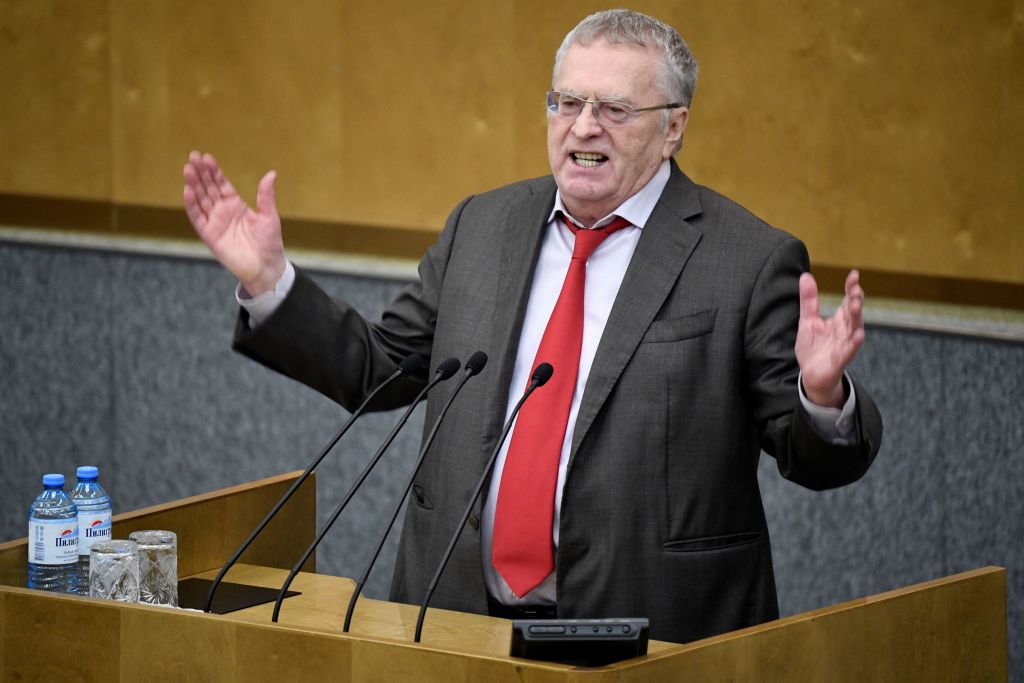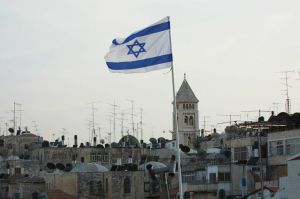The beginning of the year has not gone as well as it could have for Vladimir Zhirinovsky. Mostly because he is now dead, but also because Zhirinovsky, a Russian politician of the “managed” (pro-Kremlin) opposition, predicted and vigorously supported Russia’s invasion of Ukraine. If Zhirinovsky were able to follow the campaign from his hospital bed, it could not have met his expectations. The imperial Russia of his imagination ought to have come into glorious existence, but its armed forces instead suffered reversal and humiliation.
Zhirinovsky was the long-time leader of the Russian Liberal Democratic Party — a grouping that, as many wags have separately concluded, was under his leadership neither liberal nor democratic nor, in some lights, a party. Russia’s Liberal Democrats are an ultra-nationalist prop of the Kremlin, and Zhirinovsky was their clown prince: a vulgar militarist who led the party for thirty years through many election campaigns and public scandals.
Big and bloated, especially by the end, Zhirinovsky was a perfect foil for a Kremlin machine which positions itself as patriotic and pragmatic — the only alternative to the chaos of a real democracy. He dressed badly and had gross manners. Zhirinovsky was a proud anti-Semite who later admitted that his father was Jewish. His appetites were outsized — for attention and for war. Opponents called him “god’s monkey,” the opposite of a holy fool.
In 2000, when Zhirinovsky stood for election to the presidency (one of innumerable failed campaigns) as a semi-serious candidate, his call for people to dream of the day “when Russian soldiers can wash their boots in the warm waters of the Indian Ocean” duly scared the world’s liberals.
Zhirinovsky’s politics were deliberately absurd, comically so. He was pointedly inconsistent. He promised free vodka for the people in 1991, although it could not have worked: he finished third in the election for president. He declared later that if elected, unlike the pansies in power, he’d set up a real dictatorship. He favored summary executions for criminals, the invasion of Finland and Alaska, military confrontation with all comers in the Persian Gulf and, perhaps strangely, the selling of Russia’s disputed Kuril Islands to Japan.
Zhirinovsky wanted to bomb Poland and the Baltic states, London, Washington, Paris and Berlin.
If these sound like policies, something a real — if excitable — party might put together, they largely were not. Instead, Zhirinovsky was an emblem and a caricature. He was the vulgarity of Russian nationalism made flesh — so extreme as to be almost harmless. His outbursts on the subject of female American politicians, gays, Jews and Muslims, sometimes elicited shock abroad, but at home were received with about as much seriousness as if he had announced himself to be in personal contact with little men on Mars.
He was a useful tool for those with real power. The Kremlin manages a suite of opposition parties within the Duma — each of them largely loyal to Putin and his vision. Each stakes out a place on the political spectrum a little distinct from Putin’s United Russia party — but they lack numbers and coordination, and largely get out of the way of the party of government. Zhirinovsky was Russia’s militarist id in parliament, never completely disentangled from the machinations of its real government.
By the end of his life, though, Zhirinovsky was a grotesque fixture of the Duma, a perverse political institution. For his service to those in power, Zhirinovsky was awarded the Order for Merit to the Fatherland numerous times. He was garlanded with political honors, a puppet politician. When he was given a medal by Putin in 2016, Zhirinovsky used the platform to declare his fidelity to the Czar.
So long as Zhirinovsky was in the Duma, and standing for election, the religious nationalism of Vladmir Putin appeared saner and more reasonable to many Russians. Putin could make war for decades and merely seem strong and decisive, while Zhirinovsky cheered him on from the sidelines and loudly asked why he only attacked some of the countries and people who were so deserving.
Like Putin and his foreign minister, Sergei Larvov, Zhirinovsky was never far away from nuclear blackmail. His response to the shooting down of a Russian fighter by Turkey in 2015 was typical: he suggested that Russia detonate so large a nuclear device in the Hellespont that it drown Istanbul and innumerable millions. (He once suggested using a similar nuclear tsunami to punish Britain.)
Zhirinovsky believed in the strength and, strangely enough, the sexual prowess of the Russian military. He leavened his comments about foreign leaders, especially women, with variations on that theme.
He thirsted to confront the NATO countries militarily, and said of Ukraine in 2018: “It’s our territory; it’s our people. It’s part of our country.”
Ukraine was a well-worn subject for Zhirinovsky. He disputed its right to exist and supported every proposed opportunity to make war upon it. Unnoticed at the time, but since famous, he effectively predicted Russia’s invasion of Ukraine months in advance.
“At 4 a.m. on February 22 you’ll feel our new policy,” he said in December 2021. “I’d like 2022 to be peaceful. But I love the truth, for 70 years I’ve said the truth. It won’t be peaceful. It will be a year when Russia once again becomes great.”
Russia didn’t invade on that day. Instead, Putin recognized the Donetsk and Luhansk “people’s republics,” which prefigured a full invasion. Hostilities began two days later, at 4 a.m.
Zhirinovsky was either in a medically induced coma at the time, or shortly thereafter entered one. He had a bad case of Covid. He didn’t live to see Russian troops killed in their thousands, their armored vehicles and aircraft blown to pieces by sophisticated weaponry partially supplied by countries Zhirinovsky wanted to invade, or attack with nuclear weapons. He didn’t see millions of dollars of Russian equipment being hauled away by tractors.
The rest of the world is concentrated, with horror, on the atrocities committed by Russian forces in Ukraine — things that were suspected but only proven when the Russians retreated leaving moldering bodies behind. The world is disgusted, but Zhirinovsky — if he had lived to see it — would have cheered.


















